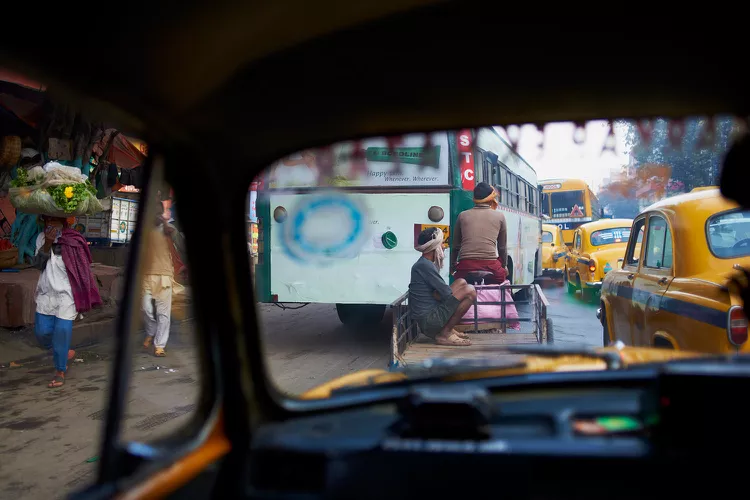Summary of Common Scams in India
It’s impossible to come to India and not encounter at least one scam or someone trying to rip you off. You shouldn’t be paranoid, but it’s wise to be very aware and cautious. Here are the details of the most common scams that you’re likely to find in India.
Pretending not to Know the Way to Your Hotel
This scam is often attempted on visitors arriving at Delhi airport who take a pre-paid taxi to their hotel. During the journey, the driver may claim he doesn’t know where your hotel is (or that it’s full or doesn’t exist) and offer to take you to another hotel or a travel agent who can find you accommodation.
Many travelers fall for this scam as they’re tired from their flight and overwhelmed by their new surroundings. It’s essential to insist on being taken to your intended hotel. Additionally, do not hand the pre-paid taxi voucher to the driver until you reach your destination; the driver needs this voucher for payment from the taxi office.
Saying that the Place You’re Looking for has Moved or is Closed

This scam is prevalent throughout India, especially at major tourist destinations. In Delhi, travelers looking for the International Tourist Bureau/Passenger Reservation Center may be misinformed that it’s closed or relocated, leading them to a travel agent instead. At New Delhi Railway Station, visitors may also be told that their train has been canceled, requiring them to take a different means of transportation.
Variations of this scam are frequent when trying to visit shops or attractions that are allegedly “closed.” In each instance, expect offers to take you to alternative locations, often presented as “better” options. It’s best to simply ignore these claims and proceed with your original plans.
Importing Gemstones Duty Free

This prevalent scam occurs particularly in Jaipur and Agra, where tourists often purchase gemstones. Travelers are approached by gem dealers who persuade them to buy gemstones under their duty-free allowance and then sell them back home at inflated prices. The details about the “partner” who would buy the gemstones are untrue, leaving you with worthless gems.
Reports have also surfaced of scammers posing as fellow travelers. Be cautious of anyone trying to forge friendships or solicit help. You might not be asked to purchase gems outright but could be asked for a “financial guarantee” like your credit card number. Always be wary of such proposals.
Making the Meter Run Fast

While many taxi and auto rickshaw drivers are honest, others may manipulate their meters to run faster, leading to inflated fares. Thus, it’s advisable to keep an eye on the meter and ensure it’s ticking at a consistent rate. Sometimes, drivers might claim the meter is broken and propose a higher flat rate instead. Always insist on using the meter.
If you notice the meter running excessively fast, notify the driver and give him a chance to “fix” it. If you know the standard fare to your destination, pay only that amount. Should the driver resist, suggest heading to a police station to resolve the discrepancy.
Offering a Reduced Taxi Fare in Return for Visiting Emporiums

This scenario isn’t strictly a scam; however, it can become quite bothersome. Taxi drivers often present a lower fare if tourists agree to make stops at various expensive handicraft emporiums along the way, allowing them to earn commissions. Although no purchases are needed, the catch often arises when the number of stops grows from “a few” to at least five or six to maximize commissions.
The sales people in these emporiums can be quite persistent, making the experience feel endless. If you prefer to reach your destination quickly without the extra detours, it’s advisable to avoid such offers and pay the full taxi fare.
Paid Blessings

In religious areas, particularly near the ghats in locations like Pushkar and Varanasi, sadhus (Hindu holy men) may approach tourists offering blessings. After tying a red holy thread on your wrist, they may demand a significant amount of money in return. Be cautious of fake sadhus who solicit donations. You are not obligated to pay excessive amounts in such scenarios; only contribute what you deem reasonable.
This guideline applies generally whenever someone requests an inflated price for a service. Always negotiate a price beforehand to avoid inflated charges at the end of the service. Moreover, remain cautious of anyone seeking to assist or provide directions, as they may inevitably ask for money.
Begging Scams

It can be heartbreaking to see individuals, often with a “mother” and sleepy baby, begging for money at traffic lights throughout India. However, be aware that these babies are sometimes rented and sedated for the day. Another common scam involves tourists being approached with requests to purchase powdered milk for a baby, guided to nearby shops where it is overpriced. If you hand over money, the beggar and shopkeeper may split the proceeds.
Money Scams

It’s vital to keep a close watch on your money while in India. Scammers may try to short-change you using deceptive tactics, including sleight of hand. For instance, you might give the correct amount, but the scammer may “vanish” some notes while counting, subsequently claiming insufficient payment. If you confront them confidently, the missing bill may magically reappear.
Alternatively, if you pay with a large note like 2,000 rupees, the scammer might claim it’s fake and secretly swap it for a counterfeit without your noticing. Be cautious and informed about the currency to avoid falling victim to such scams.





